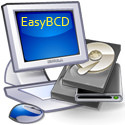Hello and welcome to EasyBCD 2.0! 
It’s rather hard to believe, but EasyBCD 1.7.2 has been out for over 2 years now, and we’ve been working on Version 2.0 ever since. In that time, a lot has happened. Windows 7 has shipped, ext4fs is the new cool kid on the Linux block, GRUB2 is finally seeing some adoption, VHDs are the new wow, and everyone and their grandmother want a dual-boot between Windows 7 and Windows XP.
Worry not, we haven’t been sitting on our (not-so-proverbial) behinds this whole time. In fact, the entire NeoSmart team – developers, supporters, testers, and all – have been working around the clock to make EasyBCD 2.0 the biggest, coolest, greatest, and awesomest thing ever since the invention of the MBR. And now, over a 150 beta builds later and 2 years in the making, we’re super-pleased to introduce you to EasyBCD 2.0. It’s so incredibly overhauled and improved, so stuffed-to-the-brim with features, so much of a true one-click dual-boot experince, so customizable, so powerful, and so EASY that it took a lot of self-restraint to keep from calling it EasyBCD 10.0!
What’s new, you ask? We’ll get to it. But let’s just first give you the download link, because we know you just can’t wait to get your grubby, geeky paws on it ASAP:
Download EasyBCD 2.0.1 (1337 KiB)
(Yes, it really is 1337 kibibytes in size. And, no, we didn’t do it on purpose. We’re just übercool that way!)
Continue reading →





